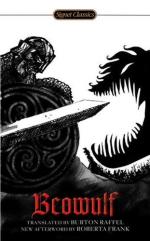|
This section contains 1,996 words (approx. 5 pages at 400 words per page) |

|
Tyrus Miller is an assistant professor of comparative literature and English at Yale University, where he teaches twentieth-century literature and visual culture. His book Late Modernism: Politics, Fiction, and the Arts Between the World Wars is forthcoming. In the following essay, Miller examines how Wilbur echoes the strangeness and enigmatic nature of his poem's predecessor.
Richard Wilbur's "Beowulf" provides an ironically truncated and lyrically simplified version of the Old English epic poem of the same name, which may date from eighth-century England. The original Old English poem, one of the most extended and powerful works of Anglo-Saxon to have survived, has several unresolved puzzles about it that lend it an air of mystery and strangeness. Its archaic and poetically stylized language, its origin in oral tradition predating its transcription, the loss of parts of its manuscript to fire in the eighteenth century, the reference of the poem...
|
This section contains 1,996 words (approx. 5 pages at 400 words per page) |

|




